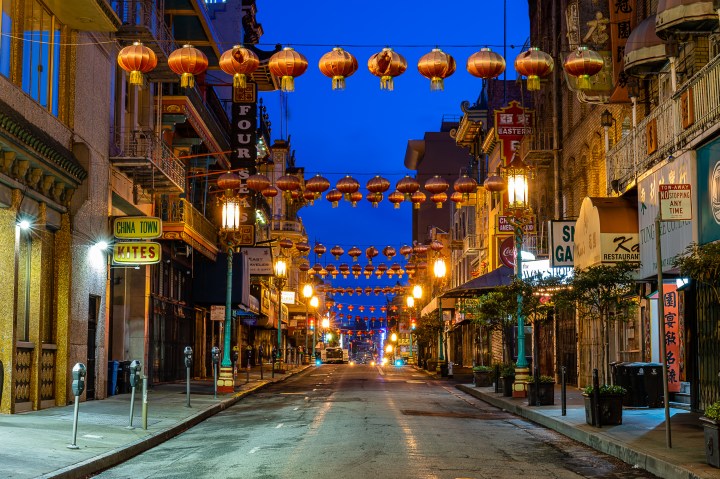
Advocates fight to save North America’s Chinatowns

Across North America, Chinatowns are suffering. Between the lingering effects of the COVID-19 pandemic, increased anti-Asian racism and development plans displacing local residents, these communities are struggling economically and socially. In the United States, more than 11,000 instances of anti-Asian hate were reported to Stop AAPI Hate since March 2020. In response, many small businesses are closing earlier or leaving town all together.
Organizers from 18 Chinatowns across the United States and Canada met up at the Chinatown Solidarity Conference in Vancouver to discuss ways to navigate these challenges and reclaim their communities. “So many of our problems are common ones,” said Carol Lee, chair of the Vancouver Chinatown Foundation. “If we work together, we can solve some of them.”
Amy Yee, a staff writer for Bloomberg CityLab, wrote about the hardships these communities face. She spoke with “Marketplace” host Kimberly Adams about the conference in Vancouver and how racism and displacement have affected these neighborhoods.
The following is an edited transcript of their conversation.
Kimberly Adams: You attended this first-of-its-kind meeting in Vancouver focused on the economies of various Chinatowns across North America. So what prompted this meeting?
Amy Yee: I think there’s a recognition that there are a lot of existential challenges that Chinatowns face across North America. So it’s a combination of many factors, but economic decline, gentrification, public safety — those are converging issues that many of these Chinatowns and Asian communities across the country face.
Adams: What are some of the specific economic issues that came up a lot at this conference that these communities seem to be experiencing really keenly right now?
Yee: Some of the economic challenges are, let’s say, the plight of small businesses. Chinatowns are known for mom-and-pop shops and restaurants, groceries, the bakeries, salons — the things that make it a bustling commercial center. So many small businesses across the board are having challenges, and small businesses in Chinatowns especially so. And because of a confluence of factors, from public safety to the lack of access to government support, the small businesses face challenges that are probably more acute than even the average small businesses, which are facing major problems as well.
Adams: There was a lot of anti-Asian sentiment, even violent attacks in Chinatowns, early on in the pandemic, and much of that has continued. What’s been the lasting impact of that kind of hate and discrimination on these neighborhoods?
Yee: I saw that for myself when I was in Vancouver Chinatown last year. That was my first time to Vancouver. And I was pretty shocked at the vandalism that I saw — shattered storefront windows, historic murals that were defaced. You’re going to hesitate to take your family or your children if there’s open drug use or if people are shouting racial slurs at you, which did happen to me when I was there, just in May. People will tend to stay away if they don’t feel safe, and it’s very hard for a small business owner to keep their stores open.
Adams: It sounds like the economic recovery that some restaurants and other parts of the service industry have seen has not landed so equally on Chinatowns.
Yee: Yes, and it will vary from place to place. Every city is different. But that seems to be a common challenge. So let’s say New York City Chinatown, which is a large Chinatown. During the pandemic, you know, there was lots of data to show that the Chinatown faced a disproportionate negative impact from the pandemic — less foot traffic and then there was also less government aid, you know, ranging from small business loans called [Paycheck Protection Program] loans to other kinds of government assistance and, you know, fewer small businesses got those kinds of loans. So if you were already, you know, disproportionately challenged, and then you couldn’t access those loans, you just fall deeper into the hole. You know, a good guess is that many of these small businesses have not recovered.
Adams: What do these businesses and community leaders from the various Chinatowns hope to accomplish with this new kind of coordination?
Yee: The conference was just a way for different kinds of advocates to share their experiences, to share things that might be working, but also to seek support because there is no silver bullet. It takes a lot more than individual advocates, you really need government support. Vancouver Chinatown a year ago when I was there, it just seemed like, you know, there wasn’t much hope. And I thought, “This is a dying community,” which is just a terrible shame since it’s a historic place. But less than a year later, there has been a lot of government support. There’s been a lot more funding allocated to Vancouver Chinatown, and advocates there feel hopeful. So that is a pretty inspirational and profound message to others.
There’s a lot happening in the world. Through it all, Marketplace is here for you.
You rely on Marketplace to break down the world’s events and tell you how it affects you in a fact-based, approachable way. We rely on your financial support to keep making that possible.
Your donation today powers the independent journalism that you rely on. For just $5/month, you can help sustain Marketplace so we can keep reporting on the things that matter to you.

















